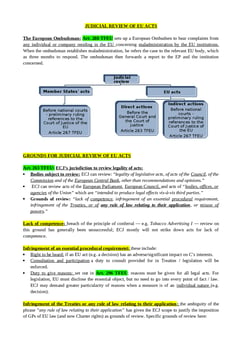Piraiki-Patraiki v Commission [1985] ECR 207
Judgement for the case Piraiki-Patraiki v Commission
Table Of Contents
Plaintiffs, who exported cotton to France, sought to challenge a Council decision to allow the French government to impose quotas on cotton imported to France from Greece.
Plaintiffs argued that because they were the dominant undertakings exporting cotton from Greece to France, had been so for a long time, and that there were strong barriers to entry, such as factory costs, etc., they constituted an individually identifiable class and that the activity was not one that anyone could just take part in (seems to make sense from economic POV).
ECJ rejected this and denied standing.
ECJ
The need for national implementation of the decision is insufficient to rule out the possibility of a decision ‘directly affecting’ Plaintiffs.
-
Also the fact that the French govt could have theoretically chosen not to take advantage of the power to impose quotas did not prevent the decision from directly affecting Plaintiffs, since the French always intended to use those powers, so that it cannot be argued that it was the national, rather than EC decision which affected Plaintiffs directly.
Therefore Plaintiffs were directly affected by the decision.
HOWEVER there was no ‘individual concern’: The export of cotton was merely:
A commercial activity which can be carried on by any enterprise at any time. It follows that the disputed decision concerns the applicants in the same way as any other firm which is, actually or potentially, in an identical situation.
The only exception is for companies who had concluded contracts before the decision was reached and notified to those companies, and whose contracts were supposed to be performed in the period after the quotas were in fact brought in.
Those companies were individually concerned as they are distinct from all the others.
This judgment is good on what is meant by ‘directly affected’, but wrongly follows Plaumann on ‘individual concern’: it is economically wrong to say that anyone could enter the export market as there are barriers to entry! Same objections to Plaumann apply.
RELATED CASES
For Further Study on Piraiki-Patraiki v Commission
Need instant answers? Our AI exam tutor is here to help.
Ask questions 🙋 Get answers 📔 It's simple 👁️👄👁️
Our AI is educated by the highest scoring students across all subjects and schools. Join hundreds of your peers today.
Get StartedSimilar Cases
Related Product Samples
These product samples contain the same concepts we cover in this case.

 Since 2010, Oxbridge Notes has been a trusted education marketplace, supplying high-quality materials from top achievers at universities like Oxford, Cambridge, LSE, Harvard, and Yale.
Since 2010, Oxbridge Notes has been a trusted education marketplace, supplying high-quality materials from top achievers at universities like Oxford, Cambridge, LSE, Harvard, and Yale.